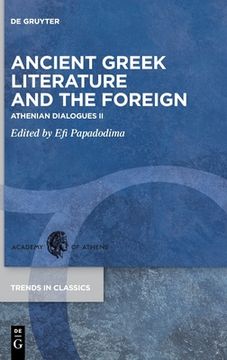Reseña del libro "Ancient Greek Literature and the Foreign: Athenian Dialogues II (en Inglés)"
Within the frame of the sub-series Athenian Dialogues, this volume comprises a selected number of talks delivered at the annual Seminar of the Research Centre for Greek and Latin Literature of the Academy of Athens 2018-2019 on the broad topic of Ancient Greek Literature and the Foreign. The volume aims at building on the ongoing dialogue on the par excellence intricate, as well as timely issues of "ethnicity," identity, and identification, as represented in ancient Greek (and, secondarily, Roman) literature. This is certainly a richly researched field, which extends to interdisciplinary areas of inquiry, namely those of classical studies, archaeology, ancient history, sociology, and anthropology. It is this interdisciplinary scope that makes the subject all the more relevant and worthy of investigation. The volume ultimately highlights new or under-researched aspects of the broad theme of ancient inter-cultural relations, which could in their turn lead to more detailed or more specified inquiries on this ever relevant and important, as well as universal, topic. Through the contributions of expert scholars on these areas of inquiry (Konstan, Lefkowitz, Paschalis, Seaford, Thomas, Vasounia, Vlassopoulos), the volume: (1) revisits key themes and aspects of the ancient Greek world's diverse forms of contact with foreign peoples and civilizations, (2) lays forth new data about specific such contacts and encounters or (3) formulates new questions about the very texture and essence of the theme of inter-cultural relations and forms of communication. More specifically, the volume addresses the following themes: the overarching role and function of the barbarian repertoire in Greek literature and culture, which certainly call for further theoretical investigation (Vlassopoulos); the highly popular but actually controversial theme of xenia in the Homeric epics and in archaic thought (Konstan); the intricate, intriguing role of the Foreigner as a focus for civic unity (Seaford); the role of the enigmatic figure of Dionysus from Greece to India (Vasunia); the representation of barbarians in Euripidean tragedy, and more specifically the portrayal of the controversial Phrygian slave in Euripides' Orestes (Lefkowitz); the meaningful changes in the representation of the arch-enemy, the Persians, across the late 5th and 4th century prose (Thomas); the adventures of Europa's legendary abduction from Moschus to Nonnus, along with its implications for the understanding of the division and animosity between the two continents, (future) Europe and Asia (Paschalis). The volume ultimately covers a wide range of ancient sources (literary and material, from Homer up to Nonnus) that delve into the interaction of ancient Greek civilization with foreign civilizations. It thus highlights new aspects of the diverse forms of contact of the Greek world with foreign civilizations and elements, both in terms of geography and particular seminal "mythical" or historical figures and forces (e.g. India and the "mysterious" Dionysus, as well as the emblematic Greek antagonist of the classical and post-classical era, i.e. the Persian Empire) and in terms of particular literary themes and motifs (e.g. the abduction of Europa).

